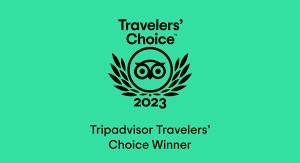Vietnam motorcycle bluecard: A guide to what it is and how to register it
Dive into the intricate world of the Vietnam Motorcycle Bluecard, your essential guide to navigating the legalities and logistics of motorbike ownership in Vietnam. This article unravels the mysteries behind the Bluecard, from its purpose and legal significance to the procedures for transfer and the challenges of counterfeit documents. Whether you’re a seasoned expat, a new resident, or a curious traveler planning to explore Vietnam’s scenic routes on two wheels, understanding the Bluecard is crucial. Join with motorbike tours in vietnam as we unveil everything you need to know to ensure your motorcycling adventure in Vietnam is both exhilarating and compliant with local laws.
Understanding the Bluecard Essentials
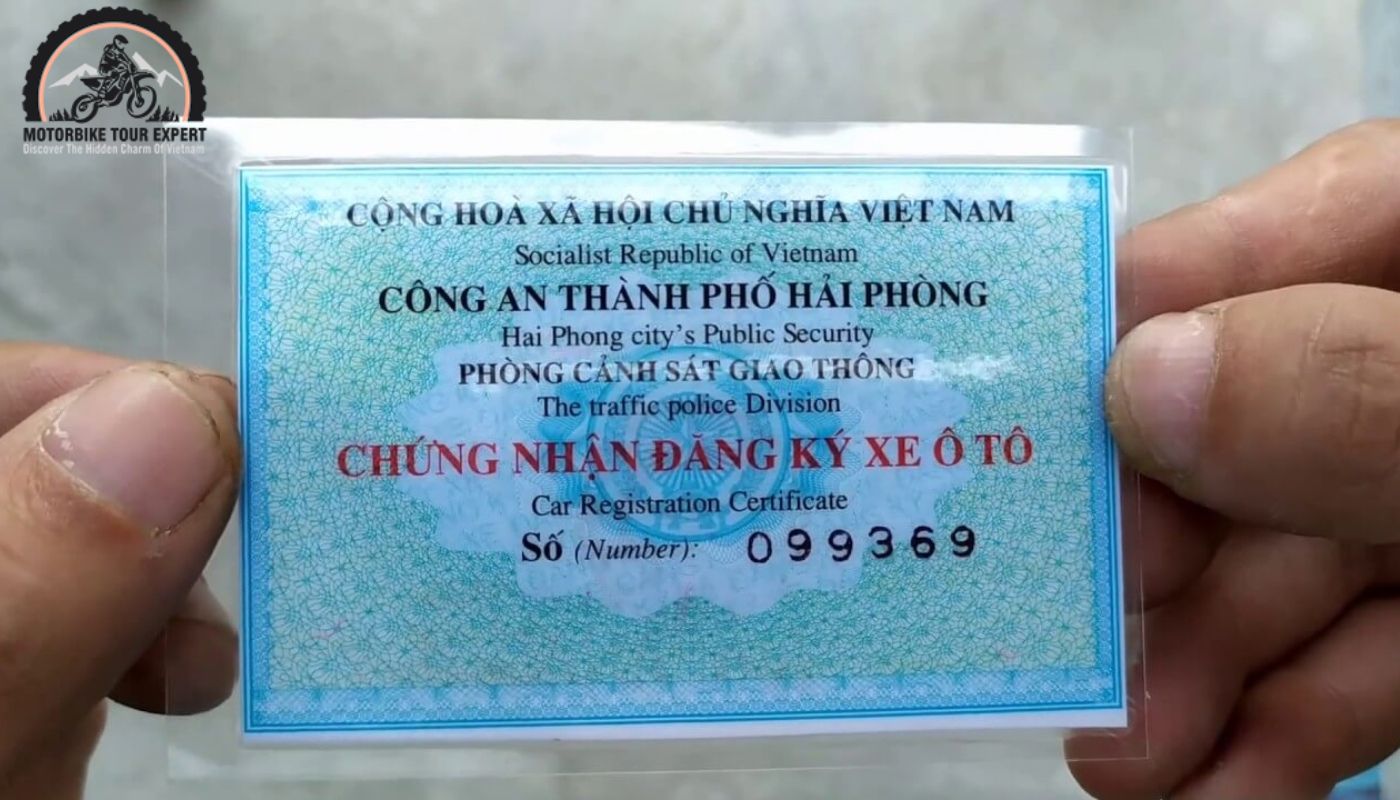
A document that legitimizes your possession and use of the vehicle on Vietnamese roads
Defining the Bluecard’s Purpose and Legality
The motorcycle Bluecard in Vietnam is the cornerstone of motorbike ownership, a document that legitimizes your possession and use of the vehicle on Vietnamese roads. It’s akin to a birth certificate for your motorbike, detailing essential information such as the engine number, frame number, license plate number, and the motorbike’s legal owner.
The significance of participating in Ho Chi Minh Trail Tours in Vietnam extends beyond mere adventure; it’s a way to explore the rich culture and history of the region, ensuring that every journey you take is not only enjoyable but also educational and respectful of local customs and regulations. These tours are essential for gaining a deeper understanding of Vietnam’s landscape, heritage, and people, providing opportunities for cultural immersion, exploration, and meaningful interactions with locals along the legendary Ho Chi Minh Trail.
Navigating Legal Obligations and Regulations
In Vietnam, the value of your motorbike often dictates the level of scrutiny your Bluecard will attract, setting a “scale of legitimacy” that impacts everything from daily commuting to selling your bike. This scale isn’t just about the physical condition or market value of the motorbike; it’s deeply entwined with the legal and regulatory framework governing motorbike ownership and use in the country.
Embarking on a Ha Giang Loop Tour demands a profound grasp of your responsibilities as a motorbike owner, encompassing the upkeep of your Bluecard’s information and discerning the consequences associated with possessing a counterfeit or incomplete Bluecard. The intricacies of these regulations underscore the indispensability of possessing a legitimate Bluecard, underscoring its significance in protecting your entitlements and streamlining your journey on Vietnam’s vibrant roads.
As motorbike enthusiasts or daily riders, understanding these legal nuances and ensuring your Vietnam motorcycle bluecard integrity is paramount in embracing the freedom and adventure that comes with riding in Vietnam.
Purchasing Motorbikes in Vietnam as a Foreigner
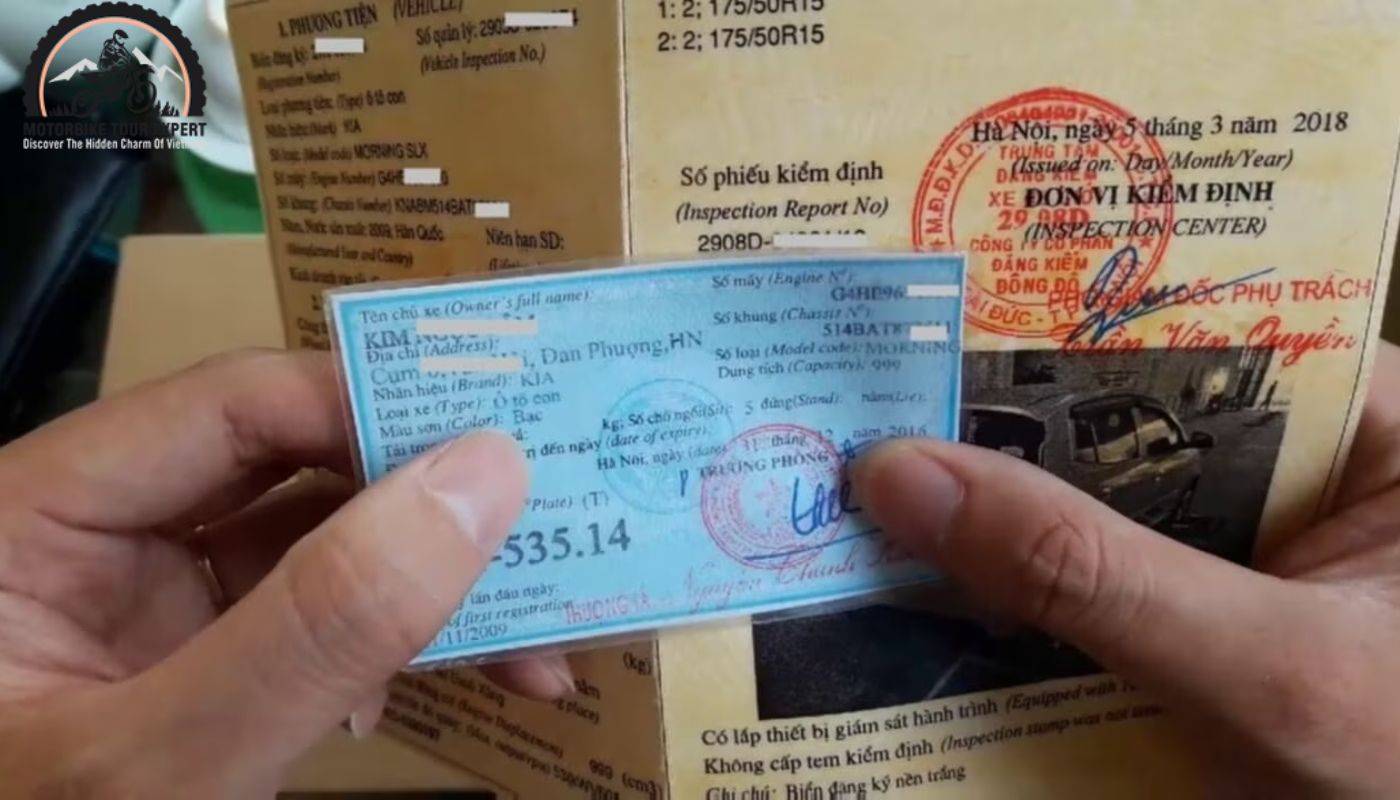
The vehicle’s ownership document
Assessing Legitimacy: Buying vs Renting
For foreigners navigating the motorbike market in Vietnam, understanding the nuances between buying and renting becomes crucial. The decision hinges significantly on the Bluecard, the vehicle’s ownership document, which encapsulates about 50% of the motorbike’s value and is indispensable for resale or legal transport of the bike.
When buying, whether it’s a modest $300 Honda Win or a premium $15000 BMW, the legitimacy of the Bluecard dictates the transaction’s smoothness and legality.
On the scale of legitimacy, a less expensive bike might have a Bluecard that’s a mere paper copy or even fake, reflecting its lower market value and a lesser emphasis on paperwork. In contrast, higher-value purchases demand authentic paperwork with matching bike identification numbers and correct owner details. Renting, however, simplifies the Bluecard concern for travelers within Vietnam, offering a copy instead of the original, with full documentation provided for border crossings, supported by a deposit system to ensure the bike’s return.
Precautions for Foreign Buyers: A Cautionary Overview
Foreign buyers must tread carefully when entering Vietnam’s motorbike market, given the complexity of legal and illicit documentation associated with various motorbike models. The market is fraught with challenges, from navigating the “scale of legitimacy” for the Vietnam motorcycle bluecard to understanding the implications of owning bikes with fake or non-transferable documents.
For bikes under $500, less stringent paperwork may be overlooked, but for those investing $3000 or more, the authenticity and matching details on the Bluecard are non-negotiable.
Within the domain of high-end motorcycles, there’s frequent interaction with Vietnam’s strict import regulations, leading to a specialized market for sought-after models often accompanied by counterfeit documentation due to unofficial imports. This highlights the importance of staying vigilant against code words like MBC and GTHL, which could indicate fake Bluecards in online listings, as well as the creative but legally dubious practices of transferring VINs and engine numbers from legally registered bikes to those brought into the country illegally. This issue is particularly relevant for those embarking on a Hanoi Motor Tour, where ensuring the legality and authenticity of vehicles is crucial for a safe and enjoyable journey.
Transfer of Bluecard Ownership
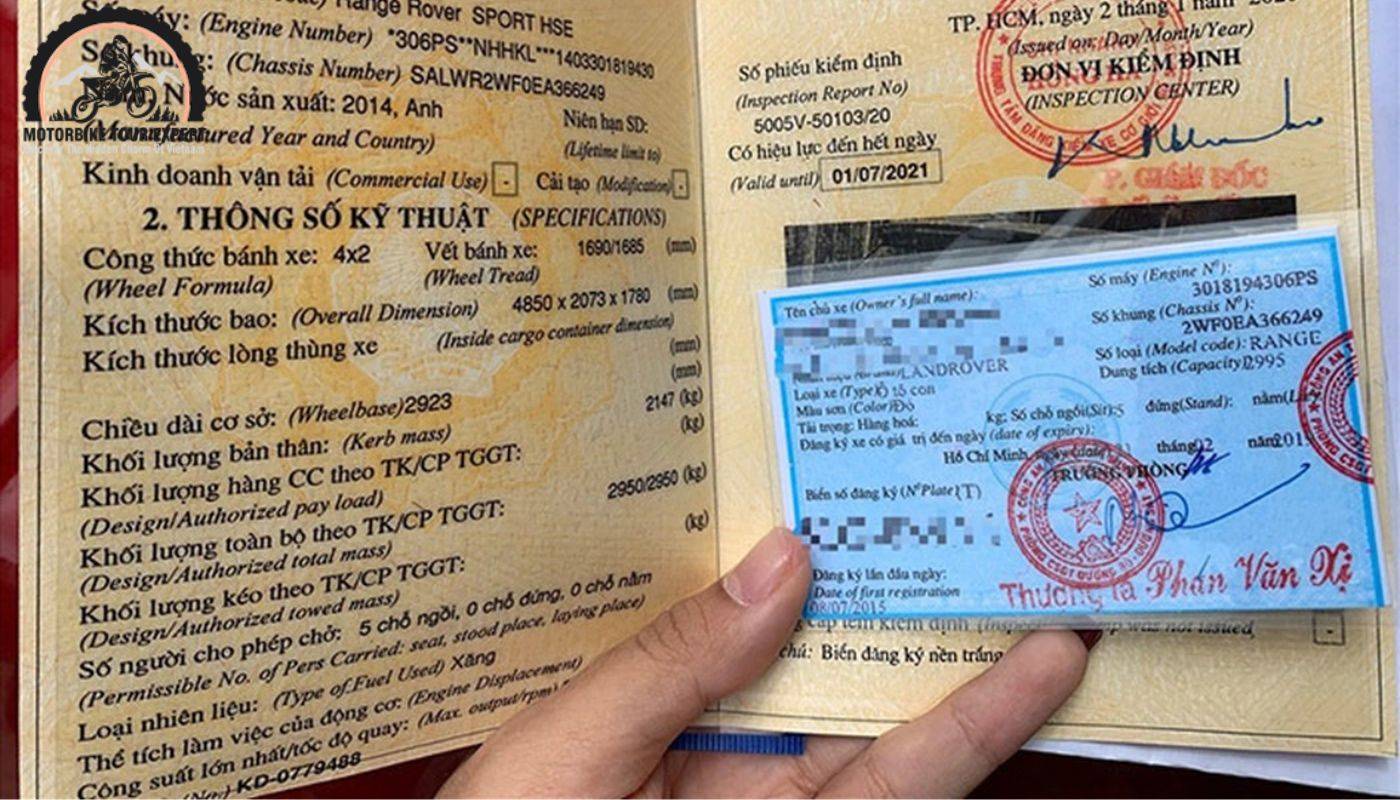
Vietnam motorbike bluecard ownership handovers
Process and Requirements for Transfers
The process of transferring ownership of a Vietnam motorcycle bluecard is notoriously intricate, and it significantly differs from one province to another, lacking a uniform procedure. This complexity, coupled with the costs involved, contributes to older, second-hand motorbikes becoming non-transferable over time.
As the motorbike depreciates, the financial and temporal investment required to navigate this cumbersome process often outweighs the value of the motorbike itself, leading to a cycle where the original owner’s details fade into obscurity.
Typically, the seller initiates the transfer by applying for de-registration of the motorbike at the police department, a process costing around 1 million dong and resulting in the temporary removal of the motorbike’s number plate.
This de-registration phase lasts about 10 days, after which the new owner receives the de-registration papers and assumes the responsibility of re-registering the motorbike—a process entailing additional taxes and fees that can range from 1 to 3 million dong, varying by locality.
Legal Framework for Ownership Handovers
Navigating the legal framework for Vietnam motorcycle bluecard ownership handovers in Vietnam is a critical step for both buyers and sellers in the motorbike market. The legal necessity to de-register and then re-register the motorbike under the new owner’s name underscores the importance of adhering to local regulations and procedures. This legal framework is designed to ensure that all motorbikes on the road are properly accounted for and that their ownership records are up to date.
However, the variation in processes and costs across different provinces can pose challenges, especially for foreigners unfamiliar with Vietnam’s administrative system. For motorbikes valued under $3000, the transfer process might be deemed too laborious compared to the vehicle’s worth, leading many to bypass the formal transfer in favor of a simpler possession of a Bluecard, regardless of the name it bears.
Registering Bluecards with Foreigner NN Number Plates
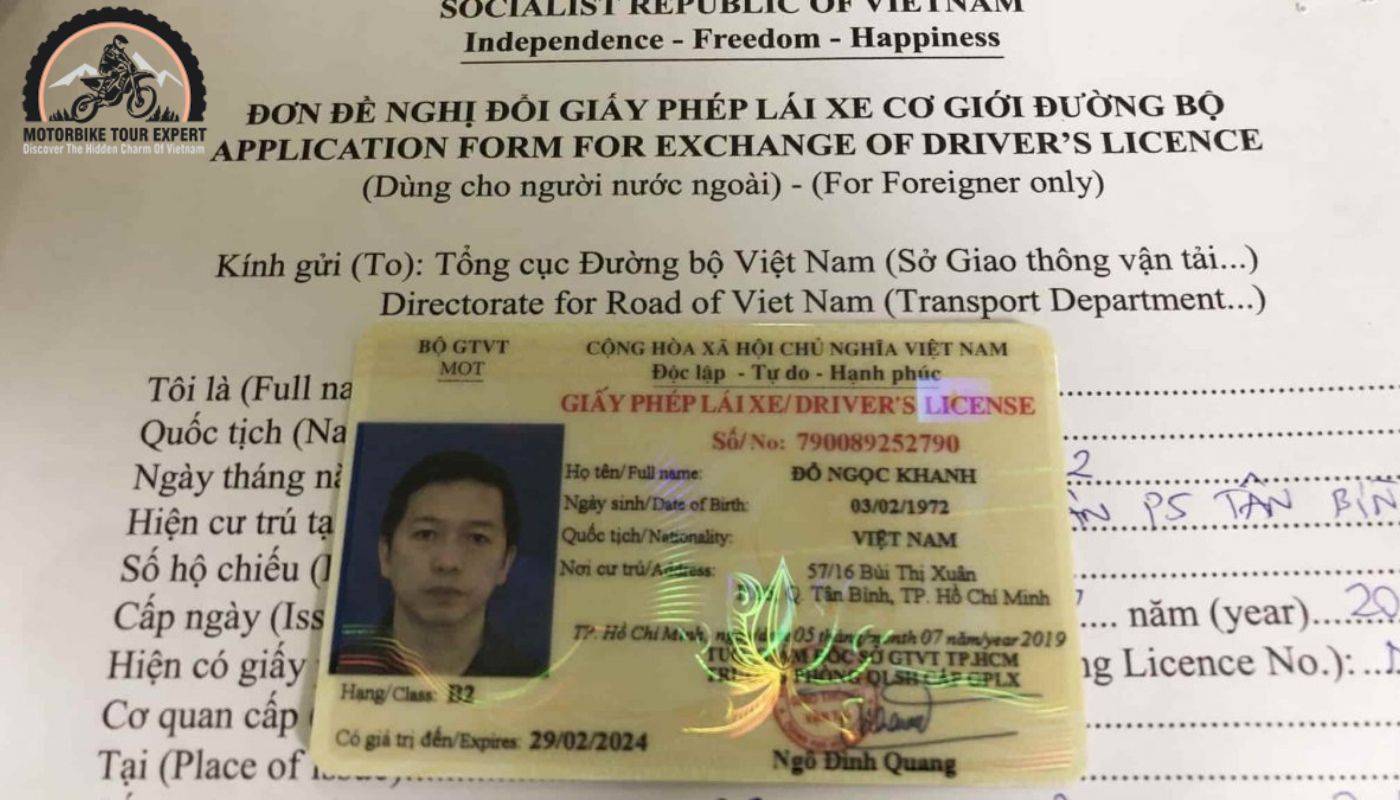
Application for exchange of motorbike driving license
Steps and Documentation for Foreign Registrants
Registering a Vietnam motorcycle bluecard with an NN number plate, designated for foreigners in Vietnam, involves a process that is both unique and complex, given its aim to distinguish non-native motorbike owners. For foreigners legally employed in Vietnam, acquiring an NN number plate is feasible, provided they possess all necessary documentation validating their stay and employment in the country.
This process typically begins at the point of purchasing a new motorbike, where the dealership plays a crucial role in facilitating the registration. Despite the clarity in the initial registration phase for foreigners, the challenge emerges when attempting to transfer NN plates to a Vietnamese owner, a procedure noted for its complexity and rarity of successful execution.
Foreigners often navigate this registration maze by leveraging relationships, opting to register the motorbike under the name of a local spouse, girlfriend, or even a colleague, sidestepping the direct involvement with NN plates.
Legal Implications for Non-Native Owners
The introduction of NN number plates for motorbikes owned by foreigners carries significant legal implications, primarily designed to allow Vietnamese authorities, especially the police, to easily identify non-native owners. However, this system inadvertently impacts the motorbike’s market value, as the NN registration complicates the process of transferring ownership to a local Vietnamese, effectively lowering the vehicle’s resale potential.
The complexity of transitioning NN plates to a local owner, within the context of the Vietnam motorcycle bluecard system, highlights the intricate challenges foreign motorbike owners face under Vietnam’s legal framework for motorbike ownership and registration. As such, foreign registrants must carefully consider these implications, often resulting in the strategic decision to register their motorbikes under a local’s name.
This workaround, while practical, highlights the nuanced landscape foreign motorbike owners navigate, balancing the benefits of identifiable NN plates against the constraints they impose on the bike’s liquidity and overall value in the Vietnamese market.
Lost Bluecards: Procedures and Responsibilities
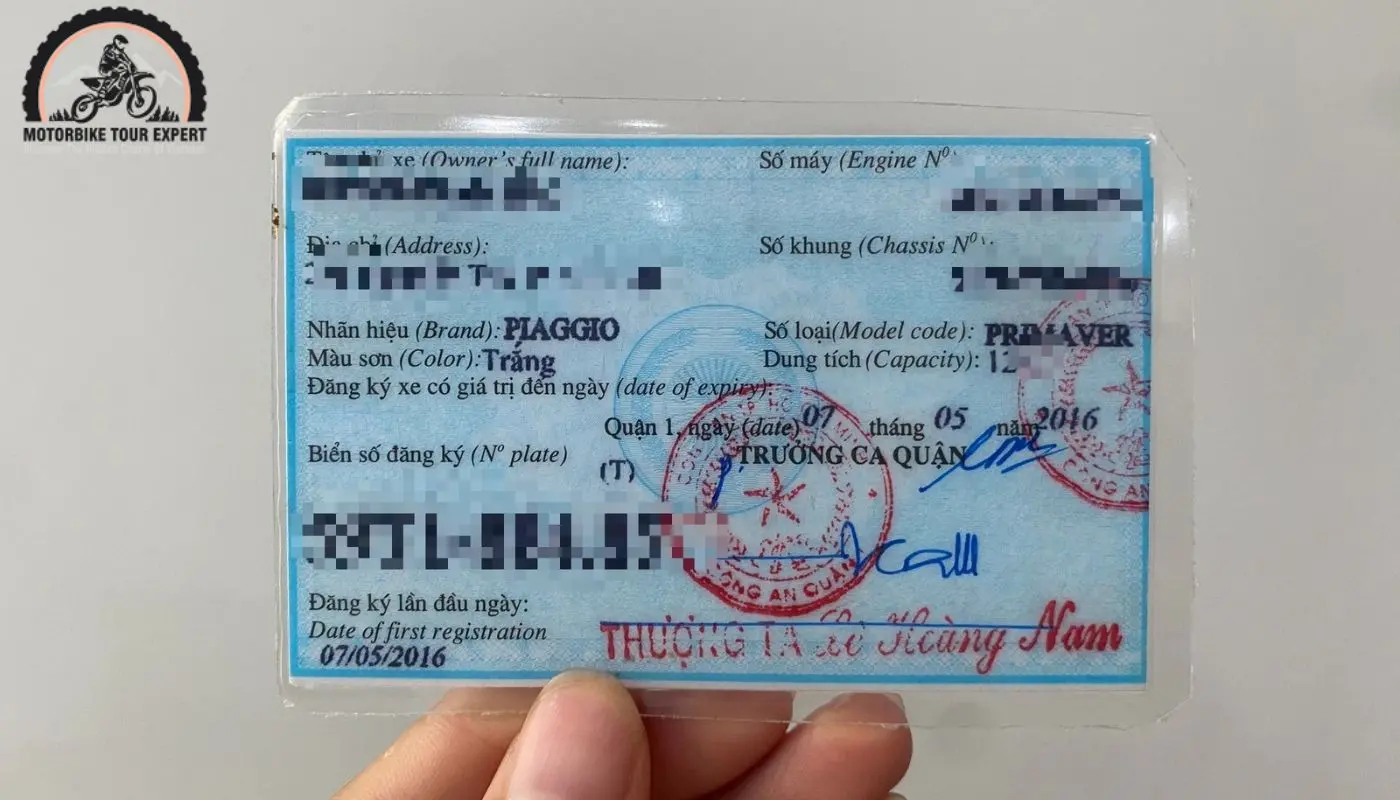
Losing your motorcycle’s Bluecard in Vietnam is a daunting scenario, yet not without resolution
Seeking Assistance for Lost Cards
Losing your motorcycle’s Bluecard in Vietnam is a daunting scenario, yet not without resolution. The initial step in addressing a lost Bluecard involves seeking assistance from those immediately around you, such as parking lot attendants or security personnel.
These individuals play a crucial role in ensuring that motorcycles leave with their rightful owners and are accustomed to dealing with documentation discrepancies up to a certain value. They’re prepared to assist, especially if you maintain possession of your parking ticket, facilitating your exit.
However, the absence of both the Bluecard and parking ticket complicates matters significantly, necessitating proof of ownership that may not be straightforward without the official document. Similarly, police intervention becomes inevitable in cases where proving motorcycle ownership is challenged by the lack of a Vietnam motorcycle bluecard, with the response varying based on the vehicle’s value and condition.
Protocols for Replacement and Liability
In the event of a lost Bluecard, especially when the card is not in the owner’s name, the path to legitimacy narrows, often leading to the acquisition of a fake replacement. Such replacements, while economically priced at a few hundred thousand Dong, render the motorcycle technically illegal, introducing a layer of complexity and risk to its use.
For rented motorcycles, rental companies generally offer solutions, albeit at a significant replacement fee, reflecting the laborious nature of official Bluecard replacement. Motorcycle owners, particularly of vehicles valued under $2000, find themselves navigating a grey area of semi-legitimacy, where a blend of official and unofficial paperwork suffices for daily operations within Vietnam.
Yet, the responsibility for replacing a lost Bluecard squarely falls on the owner, requiring engagement with local services or communities to secure a fake replacement or navigate the bureaucratic maze for an official redo. This process underscores the importance of safeguarding the Bluecard, the linchpin of motorcycle legality and ownership in Vietnam.
Tackling the Issue of Counterfeit Bluecards
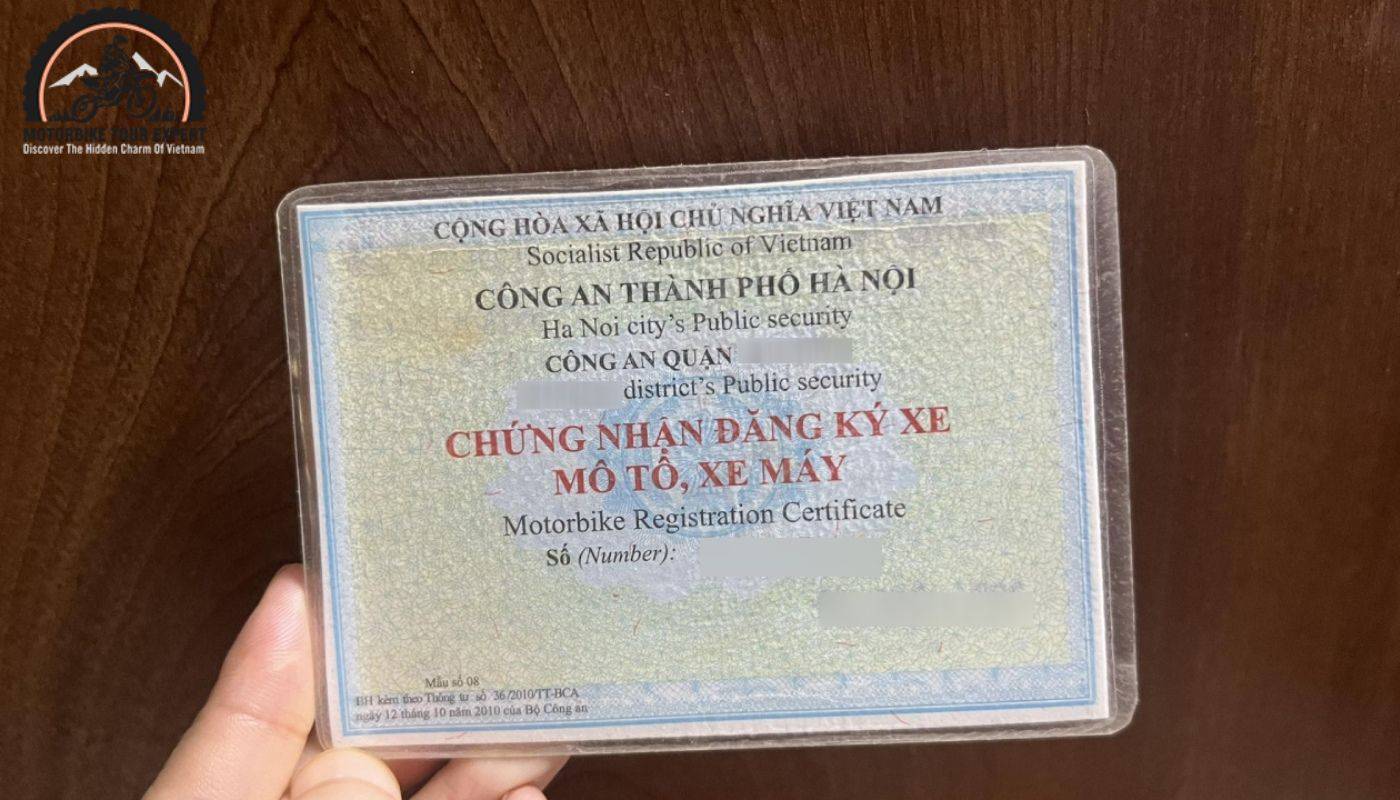
The real Vietnam motorbike bluecard
Detecting Fraudulent Bluecards
Navigating the complexities of motorbike registration in Vietnam introduces the challenge of identifying counterfeit Vietnam motorcycle bluecard – a task made difficult by the ease with which VIN/chassis numbers, engine numbers, and Bluecards themselves can be altered or forged.
Initially, a Bluecard is issued with details that match the motorbike’s VIN and chassis, entered into the police database for future reference. However, the absence of public access to this database and the potential for illicit modifications to a bike’s identifying information cloak the process in uncertainty.
Fake Bluecards often emerge from various illicit activities, including the resale of stolen motorcycles without original Bluecards, the attempt to bypass hefty import taxes on luxury or manually imported motorbikes, or the need to legitimize custom motorcycles with mismatched parts. Recognizing these fraudulent documents requires vigilance and an understanding of their common origins, emphasizing the need for potential buyers to scrutinize Bluecard’s details and seek verification wherever possible.
Legal Ramifications and Precautionary Measures
The presence of counterfeit Bluecards in the Vietnamese motorbike market carries significant legal ramifications for unsuspecting owners. Stolen motorcycles, for instance, are often sold with newly created fake Bluecards, leading to confiscation if discovered by authorities.
Similarly, bikes illegally imported to avoid Vietnam’s substantial import taxes, and those altered or custom-made from various parts, necessitate the creation of fraudulent Vietnam motorcycle bluecard to appear legitimate. Owners of such motorbikes face the risk of legal penalties, including the potential confiscation of the motorbike and fines.
To mitigate these risks, buyers are advised to undertake comprehensive checks of the Bluecard’s details against the motorbike’s physical identifiers, consider the bike’s history and origin, and where possible, verify the information with authoritative sources. Taking these precautionary steps can help navigate the murky waters of Vietnam’s motorbike market, ensuring legal compliance and safeguarding against the pitfalls associated with counterfeit documentation.
Insights into Motorcycle Insurance in Vietnam
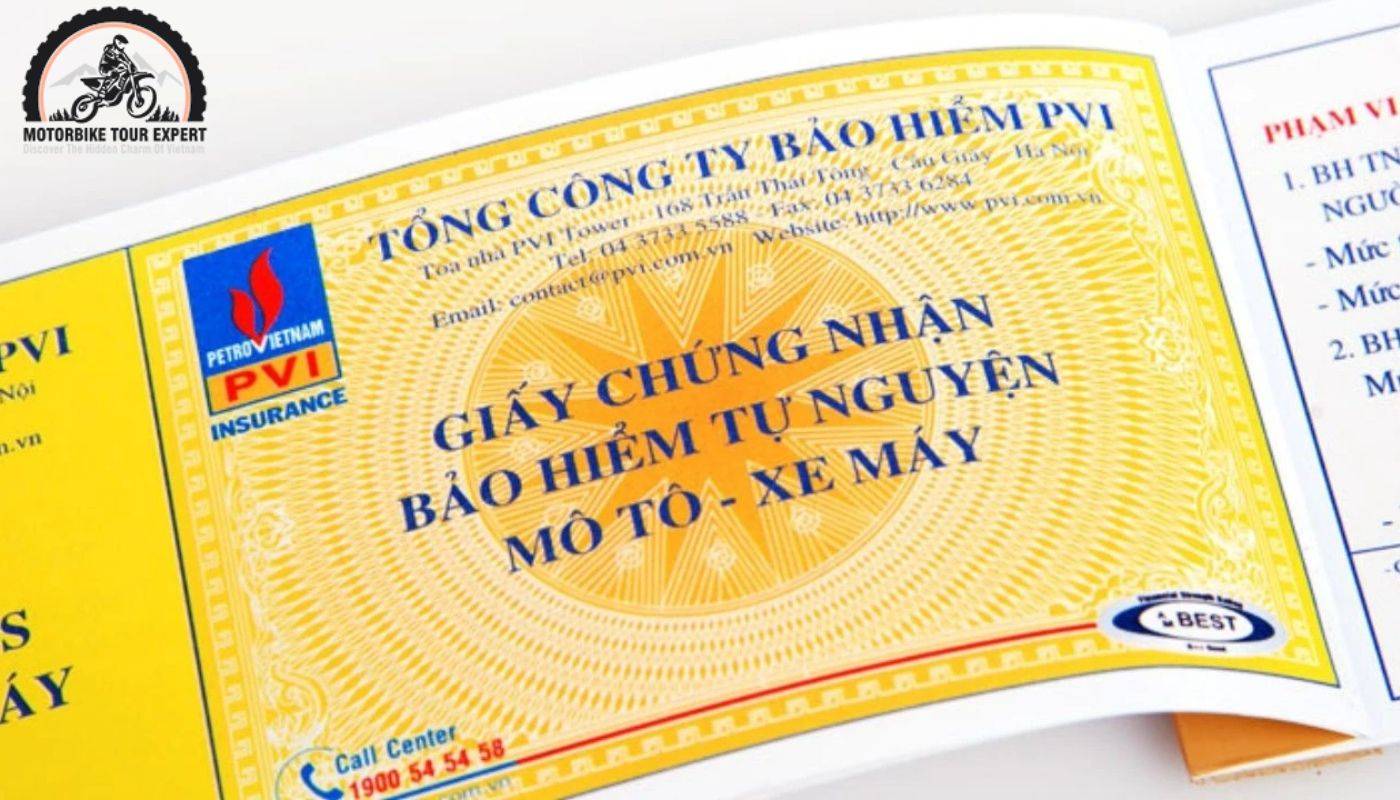
The Yellow Paper Insurance
Understanding the Importance of Insurance
In Vietnam, alongside the essential Vietnam motorcycle bluecard, motorbike owners are also required to have motorcycle insurance, commonly known as “Yellow Paper Insurance”. This insurance serves as a basic form of coverage in the event of an accident, complementing the legal identification and ownership proof provided by the Vietnam motorbike bluecard.
Despite its necessity, the practical value of this insurance is frequently questioned, as the likelihood of actually leveraging it for financial compensation following an accident is slim. This situation underscores the importance of not only possessing this insurance for legal compliance but also understanding its limitations in providing actual coverage.
The yellow paper serves more as a formal requirement than a reliable safety net, highlighting the need for riders to approach motorcycle insurance in Vietnam with realistic expectations about its efficacy in accident scenarios.
Types of Coverage and Benefits Available
The Yellow Paper Insurance that accompanies new motorcycle purchases in Vietnam is designed to fulfill legal requirements rather than offer comprehensive coverage. Typically available for an annual fee from any mechanic, this insurance is often retained by rental companies when dealing with rental motorbikes, and provided to renters upon request.
In practice, the resolution of accidents involves police assessment and potential temporary confiscation of the involved motorcycles, regardless of insurance documents. This reality emphasizes the importance of carrying the required legal documents, like the Vietnam motorbike license and Vietnam motorcycle bluecard, over-relying on Yellow Paper Insurance for accident coverage.
For motorbike owners and renters alike, understanding the actual benefits of this insurance is crucial, as any significant financial obligations arising from accidents may still need to be addressed out-of-pocket, highlighting the gap between the formal insurance requirement and its practical utility in providing protection.
In conclusion, understanding motorcycle ownership and insurance in Vietnam is crucial due to its unique challenges. The Bluecard system and Yellow Paper Insurance, while mandatory, require awareness of their limitations. Knowledge is essential, whether dealing with a lost Vietnam motorcycle bluecard, counterfeit documents, or accident aftermath. For those looking to explore the vibrant landscapes of Vietnam on two wheels, ensuring you’re well-versed in these aspects can significantly enhance your journey.
To dive deeper into the world of motorbike tours in Vietnam, and to equip yourself with expert advice and comprehensive guides for your adventure, visit Vietnam Motorbike Tour Expert via https://motorbiketourexpert.com/ now. Embark on your next adventure with confidence and the support of seasoned professionals by your side.
Contact Info Vietnam Motorbike Tour Expert:
- Head Office: 264 Nguyen Trai Str, Hanoi
- Bike Shop: 290 Nguyen Trai Str, Hanoi
- Tel/WhatsApp: +84.979884588

Vietnam Motorbike Tour Expert – One of the best motorcycle tour organizer in town to join!
















